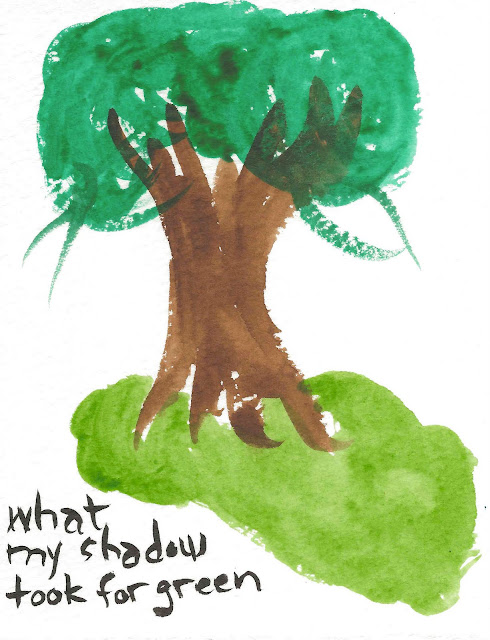19. The Voice that Needs No Echo to Sound
I wonder what the cold is. It seems to be one
of the three states of the same substance:
cold, wet, dark—the interlocking symptoms
of drowning. Our three dogs press into
the night, unaware of cold, impervious to darkness,
even the old blind one, which ventures deep
enough to disappear into the night. The colors
of the night are black for night and white
for anything that we can see within it. In
daylight, green dominates and everything
grows into its size. What is small yet infinite
at night is large yet finite during the day. Plants
surround us, prepared to conquer the world.
Maybe not in Arizona, though, which is
a different world created out of different
colors and substances. You have the same night
we have, but your day differs from ours, just
as we might share dreams but our lives differ. Lives,
as instances of daylight, always differ.
I wonder if words work the same way, if
the usual way we speak resembles
night, something that envelops us but
isn’t us. There are also the ways we use
words for ourselves, not so much
to communicate but to be, how you
visually twist a body of text until it is
something else, a contortionist of
words, a measure of your eye,
a means of not speaking, the way you
choose to not write, the stripping
of sense from every word, so that the
chitinous shell of the word remains,
empty but glistening and empty.
My mother-in-law continued to talk tonight
even after going to bed. She asked many times
what had made that last noise she had heard.
She said goodnight to the darkness, and repeated
that goodnight. She repeated the phrases she had
said many times during the day, phrases
that had lost their meaning except that they kept
her safe. The words meant nothing anymore,
but they protected her. If she had those words, if
she could only speak them, she knew she was safe.
This afternoon, I pulled out my inks,
a walnut ink of wavering browns and
India ink, which is always nothing but black,
and I drew letters and words with them,
but ones that didn’t exist, ones that existed
only as I willed them to be. While I worked,
spreading ink over pieces of white paper,
my mother-in-law kept asking me what
I was doing, and every time I said,
“I’m writing,” because writing is the process
of making words appear on a page, anything
we’ve made and seen can be a word to us.
It is too late for writing, too late for words.
Even this close to summer, the Adirondacks
hold their cold, and I need a warm sleep.
I should stop writing now, because I don’t have
the ability to write anymore, I cannot
write it right, and everything leans heavily
into sleep. I am reduced to a human weight. If I fall,
I could drown in the darkness surrounding us.
of the three states of the same substance:
cold, wet, dark—the interlocking symptoms
of drowning. Our three dogs press into
the night, unaware of cold, impervious to darkness,
even the old blind one, which ventures deep
enough to disappear into the night. The colors
of the night are black for night and white
for anything that we can see within it. In
daylight, green dominates and everything
grows into its size. What is small yet infinite
at night is large yet finite during the day. Plants
surround us, prepared to conquer the world.
Maybe not in Arizona, though, which is
a different world created out of different
colors and substances. You have the same night
we have, but your day differs from ours, just
as we might share dreams but our lives differ. Lives,
as instances of daylight, always differ.
I wonder if words work the same way, if
the usual way we speak resembles
night, something that envelops us but
isn’t us. There are also the ways we use
words for ourselves, not so much
to communicate but to be, how you
visually twist a body of text until it is
something else, a contortionist of
words, a measure of your eye,
a means of not speaking, the way you
choose to not write, the stripping
of sense from every word, so that the
chitinous shell of the word remains,
empty but glistening and empty.
My mother-in-law continued to talk tonight
even after going to bed. She asked many times
what had made that last noise she had heard.
She said goodnight to the darkness, and repeated
that goodnight. She repeated the phrases she had
said many times during the day, phrases
that had lost their meaning except that they kept
her safe. The words meant nothing anymore,
but they protected her. If she had those words, if
she could only speak them, she knew she was safe.
This afternoon, I pulled out my inks,
a walnut ink of wavering browns and
India ink, which is always nothing but black,
and I drew letters and words with them,
but ones that didn’t exist, ones that existed
only as I willed them to be. While I worked,
spreading ink over pieces of white paper,
my mother-in-law kept asking me what
I was doing, and every time I said,
“I’m writing,” because writing is the process
of making words appear on a page, anything
we’ve made and seen can be a word to us.
It is too late for writing, too late for words.
Even this close to summer, the Adirondacks
hold their cold, and I need a warm sleep.
I should stop writing now, because I don’t have
the ability to write anymore, I cannot
write it right, and everything leans heavily
into sleep. I am reduced to a human weight. If I fall,
I could drown in the darkness surrounding us.


Comments
Post a Comment